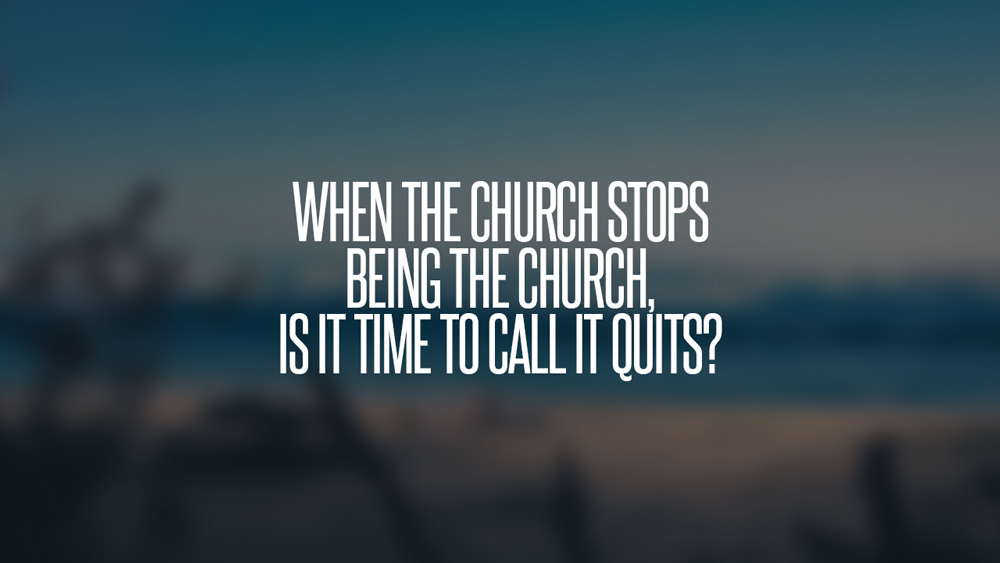I’ve written before on my life prior to Christ, how I was a church kid focused on the external, not giving a thought on what was going on internally. It wasn’t until I was seventeen when I experienced Jesus. I mean I knew of Jesus, I just never knew him. But sitting on the edge of my bed one evening he finally came alive in me. His life taking on more than simple words on the pages of an old book. This Word began scraping his pen across the pages of my heart. I didn’t pray a miracle prayer and then instantaneously my life became a rose garden, pruned nicely by a dear elderly woman with white gloves, sharp shears, and a bright smile. No, my transformation would take years. It’d sometimes prove ugly. It was more a revelation, that day sitting on the edge of my bed, and more a discovery of the mask that I’d become so used to wearing. This revelation exploded deep within me and, although my journey has proven painfully unpleasant at times, this moment was the beginning of a new life.
Twenty years later, I married a beautiful woman, entered full-time ministry, had a son, exited full-time ministry, had a daughter, worked a bunch of random jobs, and am now employed, yet again, in a church.
Since my exit of pastoral ministry, I’ve met with and had phone and email conversations with countless pastors and expastors, trying to learn more about the process in which a pastor experiences pain or burnout, why they resign, or get asked to leave. I’ve heard of the many struggles they face, some similar to my own pastoral journey, and how they’ve come out on the other end.
If you were interviewing a hundred pastors who had left the pastorate, you’d get a hundred different responses. You’d hear a hundred different stories. You’d witness a hundred different journeys. The struggles may be similar, the pain recognizable, but we’d learn a hundred new truths about the pastorate by interviewing each of them.
One of these truths, though tragic, is that pastors feel disconnected from their congregations because the body lacks a desire or has had little emphasis on reaching the community. Many times this can be a factor in a pastor’s decision quit.
In Thom Rainer’s book, Autopsy of a Deceased Church, he talks about the many reasons a church dies and one of these ways, in Rainer’s observation, is the focus on the internal and not the external. This is the opposite of what we experience in our own life, as mentioned in my story above, when we come to accept Christ as Lord. In our experience, we’re required to forsake our external selves, allowing God to do an internal work, renewing our hearts and minds. However, when it comes to the local body, the opposite is true. Our focus lies in the community surrounding the local body. Yes, as a church community we train, disciple, and send out (being the church), with an emphasis on reaching the community in which we live (go and make disciples).
“If you talk to members in a dying church,” Rainer observes, “most will deny that their church is a fortress. But in our autopsy, we found that is exactly what was taking place. People in the community did not feel welcome in the church. Those in the church were more concerned about protecting the way they did church than reaching residents of the community.”[1]
If the church acts as a fortress, by definition an “impenetrable building,” it is impervious to numerical growth, which goes uniquely against the job description (calling) of a pastor.
Billy Graham, in his work, Peace with God, explains this idea quite simply, as he often does best: “The church is for the spreading of the gospel. The church is commanded to “Go ye into all the world, and preach the gospel” and to baptize those who believe. The basic and primary mission of the church is to proclaim Christ to the lost … to throw the lifeline to the perishing sinners everywhere.”[2]



Earl Middleton
You ask a provocative question and offer bold solutions to an historically vexing problem. But I think your question answers itself. When a local church stops being the church it has already called it quits. The glory has departed, ‘ichabod’ has been spray painted across the front doors, and it is a church in name only, not truth and practice. While this might be the reality of too many local congregations God never leaves Himself without a witness in the earth. There will always be a remnant of believing communities earnestly contending for the faith once delivered to the saints, and Jesus WILL accomplish what he set out to do: build a church that will obliterate the gates of hell.